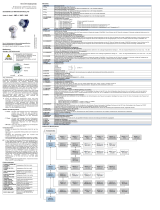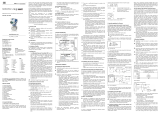
4
WIKA operating instructions process transmitter, model UPT-2x
14111166.02 04/2015 EN/DE
EN
Contents
8. Configuration via display and operating unit .........................27
8.1 Configuring the measuring task . . . . . . . . . . . . . . . . . . . . . . . . . . . . . . . . . . . . . . . . . . . . 27
8.1.1 Configuring pressure measurement..................................27
8.1.2 Configuring level measurement .....................................28
8.1.3 Configuring the volume measurement ................................29
8.1.4 Characteristic curves..............................................32
8.2 Setting the units.........................................................34
8.2.1 Setting the pressure unit . . . . . . . . . . . . . . . . . . . . . . . . . . . . . . . . . . . . . . . . . . . 34
8.2.2 Set length unit (for level measurement) ...............................34
8.2.3 Setting the volume unit ............................................35
8.2.4 Setting the density unit and density value .............................36
8.2.5 To set the temperature unit .........................................36
8.3 Scaling the measuring range ..............................................37
8.3.1 Performing a wet adjustment .......................................37
8.3.2 Performing a dry adjustment........................................38
8.4 Setting the mode ........................................................39
8.5 Mounting correction (offset) . . . . . . . . . . . . . . . . . . . . . . . . . . . . . . . . . . . . . . . . . . . . . . . 40
8.5.1 Performing a wet adjustment .......................................40
8.5.2 Performing a dry adjustment........................................40
8.6 Setting the damping .....................................................41
8.7 Write protection .........................................................42
8.7.1 Activating/deactivating the write protection ............................42
8.7.2 Change PIN .....................................................42
9. Diagnostic functions .............................................43
9.1 Simulations ............................................................43
9.1.1 Performing a pressure simulation....................................43
9.1.2 Performing a current simulation .....................................43
9.2 Display/reset drag pointer.................................................44
9.2.1 Drag pointer P
min
/ P
max
............................................44
9.2.2 Drag pointer PV
min
/ PV
max
.........................................45
9.2.3 Drag pointer T
min
/ T
max
............................................45
9.3 Display/reset operating time...............................................45
10. Detailed settings.................................................46
10.1 Setting the language .....................................................46
10.2 Marking the measuring point (TAG) .........................................46
10.2.1 Setting the TAG short..............................................46
10.2.2 Setting the TAG long ..............................................46
10.3 Setting the alarm signal ..................................................47
10.4 Setting the signal limits ...................................................47
10.5 Setting the contrast of the LC display .......................................48
10.6 Restoring factory setting..................................................48
























